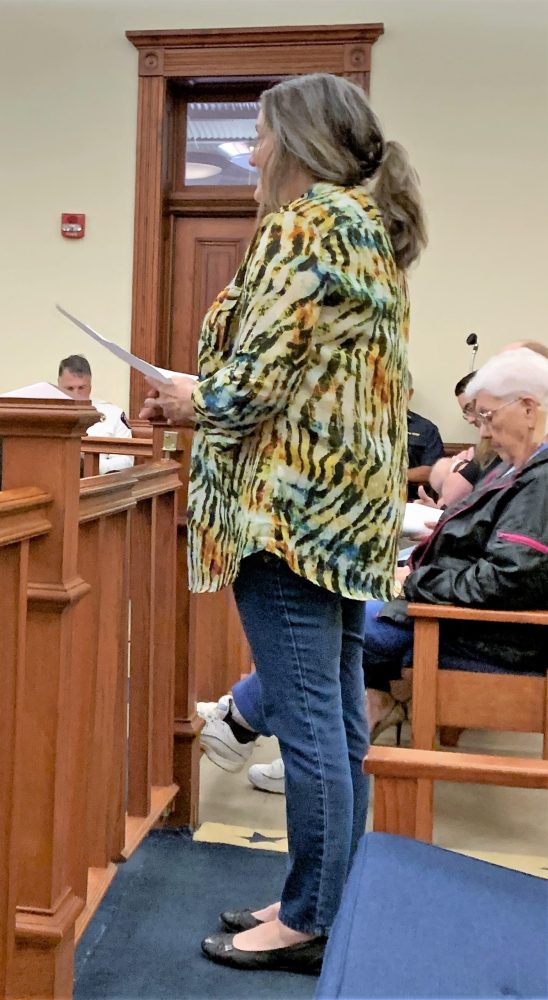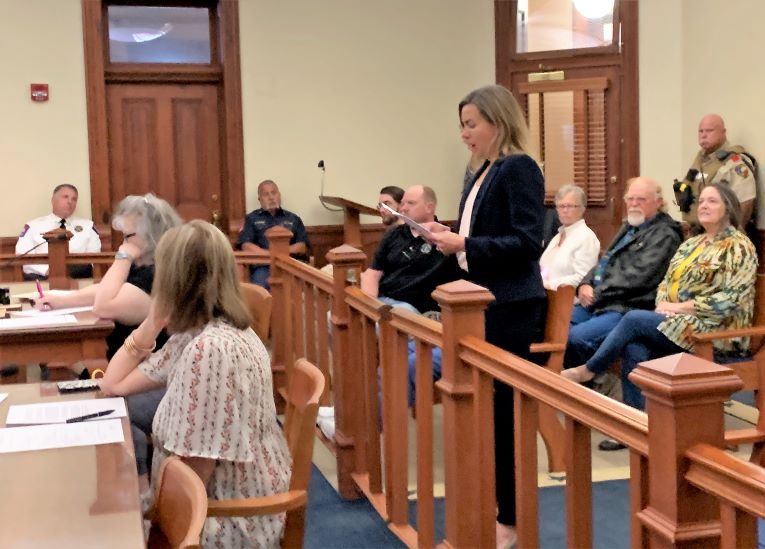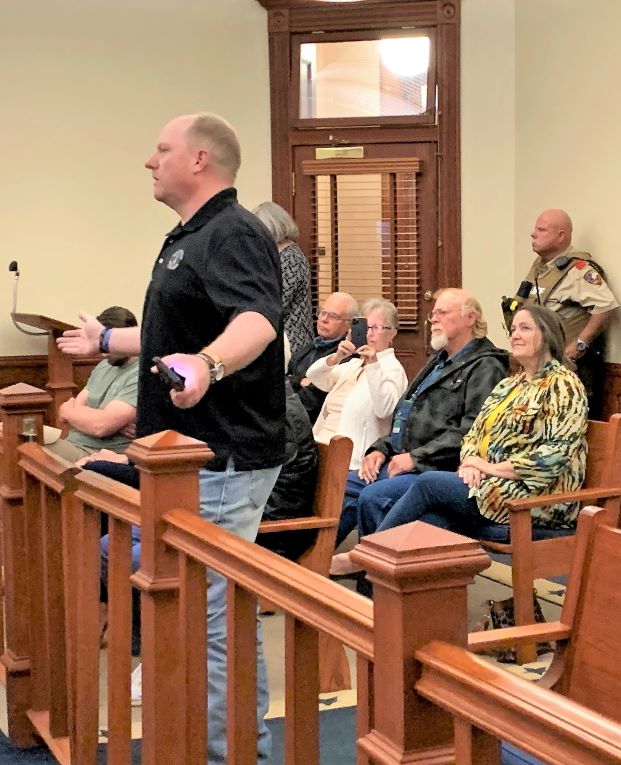Four people addressed Hopkins County Commissioners during the public forum portion of the regular court meeting this week regarding large solar complexes planned to go up in Hopkins County.

Two Dike residents who expressed disapproval of Commissioners’ decision to grant a tax incentive for Hopkins Energy, LLC, the solar facility planned in the Dike area and a third pointed out information gleaned from investigation into rising costs of solar panels and components. The fourth speaker represents Texas Real Estate Advocacy and Defense (known as TREAD) Coalition, a member-based nonpartisan organization that represents land owners in rural communities all over the state.
Dike resident Michele Barnes said she’s seen ads for the upcoming total eclipse in 2024, but would personally be embarrassed for anyone she knows to come to Sulphur Springs for the event due to the number of solar power stations in Hopkins County that would surround them on their way to Sulphur Springs and the Centerline.
She asked whether Hopkins County will become barren and jagged with changed topography like Big Bend National Park, when all of the solar projects are complete. She asked whether the court has considered the aftermath of all the solar power plants – which she contends will destroy vegetation, wetlands and animal habitats – or if their only interest in green is printed on paper.
“The only way to get those in authority to listen to the people they represent is to keep speaking up. Sometimes, that means inviting experts to come in and make you aware that we are not just blowing smoke. We have done our research and gathered data to show that there is devastation coming to Hopkins County, in large part due to your negligence of not doing the same due diligence,” Barnes alleged.
Barnes said she and other residents, including those involved with Save Dike From Solar, are determined to make the public aware of what she calls the Commissioners Court’s “Ill-informed decisions” the elected officials are making.
“I do hope you remember that you work for us, we do not work for you,” Barnes said. She also asked about records of meeting agendas posted. She noted they are to required to be posted 72 hours in advance, with 24/7 access by citizens. She said she missed the last court meeting because she did not see it posted on the public notice calendar, although a workshop was listed.
Also addressing the court was Jessica Karlsruher, executive director of the TREAD, which is lending help to the local grassroots efforts of Save Dike From Solar, which seeks to bar Engie from building a solar facility in the Dike community. Karlsruher noted she is also a sixth generation Texan, a landowner and concerned citizen about the state’s resources being jeopardized. As such, she expressed concern regarding the proposed Dike solar project.
Karlsruher said she’s aware of renewable energy projects popping up in Limestone, Erath, Camanche Lamar and other counties across Texas. Some civic leaders have turned down tax abatements and worked with communities to support land owners, while others have not.

“Hopkins County is not an ideal location for a solar plant due to its topography, its weather and surrounding water sources and overall environment,” Karlsruher contends. “It’s ironic that these projects are considered good for the environment when the project involves stripping the land of soil, disturbing the fauna and animal habitat and water sources that surround it.”
The TREAD official contends that the placement of the solar projects on 2,000-10,000 acres of land will affect waters, streams, watering holes, farm and ranch land, and will alter where people fish, hunt, and recreate in general.
Karlsruher said while some point to West Texas as a perfect location for solar plants due to the flat openness, taxing entities in far West Texas aren’t offering big tax breaks to solar companies the way they are in some other areas of the state.
“This is not about energy production, it’s about tax breaks. Even when tax breaks are no longer available, you will be looking at a solar project complex, displacing thousands of acres of precious Texas land,” Karlsruher said.
Each starts with the creation of a commercial reinvestment zone but, Karlsruher argued, they don’t fulfill the requirement for the designation established in Chapter 312 of the State of Texas Tax Code. A reinvestment zone designation is in place for five years and is supposed to contribute to the retention or expansion of primary employment or attract a major investment in the zone.
Karlsruher contends property taxes around the solar projects go up or down depending on the commercial designation for the project, “contamination of natural resources is almost inevitable, and the landowner is held responsible for the project when, not if, it is abandoned.”
She alleged that officials who make decisions without consideration for public input are not being true public servants representing their community.
She questioned whether the companies proposing the solar projects are foreign and if the local community will benefit from the energy generated from them. Karlsruher said her sources say it won’t.
While TREAD understands the need to diversify energy sources, the organization leader said, that should not come at the cost of rural communities.
“Water runoff is inevitable by the nature of the projects being erected and how they are constructed. There is no oversight and no mitigation of error and there is no plan B. There is only one Texas with nearly 700 acres a day being lost to development. It’s not only that – it’s our best land being lost. You have an opportunity and a responsibility to preserve our land and our state,” Karlsruher told the Commissioners Court.
Dike resident Kirk Reams said a month ago when he walked out his back door, all he heard was silence. He expects that will change significantly within the next 1 ½ years, to motors running and humming machinery, if the solar project is constructed in Dike as planned.

“And, right now I’m so mad, and Wade, you know I’m mad,” Reams said to Precinct 3 Commissioner Wade Bartley. “You and I have had our disagreements many times. I thought you were a servant of Dike Texas and you’re not. I’m so mad right now I could spit. This is ridiculous.”
Reams said a country resident should be able to walk out of their home and hear birds singing, see the deer running around, ducks flying over, fish jumping out of a pond. Instead, Dike residents will soon see solar panels.
“You are ruining my homeland. My family settled here in 1870 and now you’re treading my family’s stuff. I don’t appreciate it. I don’t appreciate it at all,” Reams said.
The Dike resident said it’s his understanding that every bit of the power generated will go to the Dallas area, not the local community. Reams challenged the Commissioners Court to give him three good reasons besides money why locating a solar farm in Dike is good for the Dike, Sulphur Springs and the Hopkins County community.
The final speaker during the public forum portion of the May 23 Commissioners Court meeting was Michael Pickens, often the spokesperson for Save Dike from Solar, a grassroots organization he and his mother, Cynthia Martin started along with other Dike residents in an effort prevent a planned solar plant from being constructed in their community.
Pickens said he wanted to make sure the Commissioners Court is aware of the findings of a Commerce Department investigation into the “price jumping on the solar panels that are coming across the ocean.”
Austin Solar out of California has initiated an investigation request to the Commerce Department to the Biden Administration. Investigation, Pickens said, revealed that 100 percent of the components of solar panels being bought by solar companies from businesses in Malaysia, Cambodia, Thailand and Vietnam are made in China. The products are then shipped to the US, allowing the businesses to get around the tariffs implemented a few years ago on Chinese products entering the United States, Pickens reported.
Hopkins County Judge Robert Newsom thanked the four individuals for their comments, then proceeded to the next item on the court agenda.





